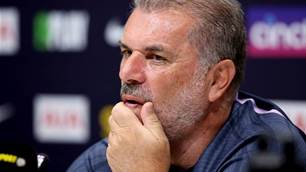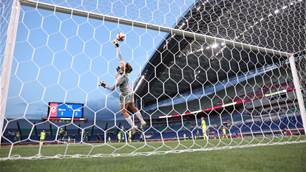When Luiz Felipe Scolari was unveiled by Chelsea at Cobham's Hilton Hotel last summer, the Brazilian coach was quick to brush aside suggestions his long absence from league management would affect his ability to do the job.
It had been seven years since his last job in club management with Cruzeiro but in the meantime he had won the World Cup with Brazil and taken Portugal to the final of Euro 2004, where they lost to Greece.
He arrived with the desire to turn Chelsea into a potent attacking force and playing the kind of free-flowing football Arsenal and Manchester United had turned into an art form.
A 4-0 home win over Portsmouth on the opening day of the season appeared to settle the nerves and provide proof, at last, Chelsea owner Roman Abramovich and his board had finally got it right.
Chelsea then strode to nine straight away wins in all competitions, with only one goal conceded, and suddenly the Blues were on course to reclaim the Barclays Premier League title they lost to United.
But the away form merely papered over the cracks that began to show at the end of October when Liverpool ended their 96-match unbeaten home league record.
A 5-0 home win over Sunderland helped restore some of the faith but a 3-1 Champions League reverse at Roma and a Carling Cup exit on penalties to Coca-Cola Championship side Burnley undermined all their previous good work.
Scolari was also hamstrung by other factors around this time. Namely injuries to a number of key players, including the loss of midfield power house Michael Essien. He was ruled out for six months and was not back on the field before Scolari was fired.
Didier Drogba was back from a knee injury but his first goal of the season in that Burnley defeat was tainted by his decision to throw a coin back at the away fans. His action brought him a three-match ban. Still, in Nicolas Anelka, Scolari had a man in form. But that wouldn't last long.
A goalless home draw with Newcastle was followed by a share of the spoils against a poor Bordeaux side in the Champions League and the storm clouds were gathering.
Chelsea had thrown away another chance to win the group and finishing first was now out of their hands. In the end, they finished second behind Roma. It was not good enough.
When Arsenal beat the Blues 2-1 at Stamford Bridge, the alarm bells should have been ringing loud and clear. Eventually, Scolari would take only one point from a possible 15 against the other top three sides. It was not good enough.
The rot really set in when a home draw with West Ham was followed by another one against League One minnows Southend in the FA Cup.
Match after match the genial Scolari bemoaned how his side had created so many chances but never put them away. It was like listening to the same long-playing record.
However, the 3-0 hammering by United at Old Trafford a month ago was the death knell. Chelsea looked unfit, uninterested and unable to compete with Sir Alex Ferguson's side.
Scolari looked on impotently. Unable to find an answer and unwilling to switch from a 4-3-3 formation that simply wasn't working.
The fans knew it, the media knew it, and yet Scolari, a World Cup-winning manager, couldn't see it. Defending from set-pieces had become non-existent and was costing them dearly.
Then two events shaped his eventual demise. One was unlucky, the other was of his own making. First he axed Drogba for the FA Cup replay at Southend.
Chelsea won 4-1 with the players muttering afterwards about a rediscovered spirit. Sadly, they lost midfielder Joe Cole for the season in the same game with knee ligament damage.
Then Scolari got lucky. Two late goals against Stoke at home saved them from another disaster. But it was only a stay of execution.
Against Liverpool, and with Drogba still exiled to the bench, Chelsea took 75 minutes to have a shot on target. They lost 2-0.
The free-flowing football had gone and eight days later, after a goalless home draw against Hull, so had Scolari.
The 60-year-old will doubtless feel a little hard done by. He only bought one player in Deco and had another on loan in Ricardo Quaresma.
It was hardly his own team. But in the event, Scolari was found wanting tactically, was too stubborn to change a system that was no longer working, and was out of his depth in the English league.
Despite his initial protestations to the contrary, he was too old school for the day-to-day business of managing a modern club in Europe.
He arrived with the desire to turn Chelsea into a potent attacking force and playing the kind of free-flowing football Arsenal and Manchester United had turned into an art form.
A 4-0 home win over Portsmouth on the opening day of the season appeared to settle the nerves and provide proof, at last, Chelsea owner Roman Abramovich and his board had finally got it right.
Chelsea then strode to nine straight away wins in all competitions, with only one goal conceded, and suddenly the Blues were on course to reclaim the Barclays Premier League title they lost to United.
But the away form merely papered over the cracks that began to show at the end of October when Liverpool ended their 96-match unbeaten home league record.
A 5-0 home win over Sunderland helped restore some of the faith but a 3-1 Champions League reverse at Roma and a Carling Cup exit on penalties to Coca-Cola Championship side Burnley undermined all their previous good work.
Scolari was also hamstrung by other factors around this time. Namely injuries to a number of key players, including the loss of midfield power house Michael Essien. He was ruled out for six months and was not back on the field before Scolari was fired.
Didier Drogba was back from a knee injury but his first goal of the season in that Burnley defeat was tainted by his decision to throw a coin back at the away fans. His action brought him a three-match ban. Still, in Nicolas Anelka, Scolari had a man in form. But that wouldn't last long.
A goalless home draw with Newcastle was followed by a share of the spoils against a poor Bordeaux side in the Champions League and the storm clouds were gathering.
Chelsea had thrown away another chance to win the group and finishing first was now out of their hands. In the end, they finished second behind Roma. It was not good enough.
When Arsenal beat the Blues 2-1 at Stamford Bridge, the alarm bells should have been ringing loud and clear. Eventually, Scolari would take only one point from a possible 15 against the other top three sides. It was not good enough.
The rot really set in when a home draw with West Ham was followed by another one against League One minnows Southend in the FA Cup.
Match after match the genial Scolari bemoaned how his side had created so many chances but never put them away. It was like listening to the same long-playing record.
However, the 3-0 hammering by United at Old Trafford a month ago was the death knell. Chelsea looked unfit, uninterested and unable to compete with Sir Alex Ferguson's side.
Scolari looked on impotently. Unable to find an answer and unwilling to switch from a 4-3-3 formation that simply wasn't working.
The fans knew it, the media knew it, and yet Scolari, a World Cup-winning manager, couldn't see it. Defending from set-pieces had become non-existent and was costing them dearly.
Then two events shaped his eventual demise. One was unlucky, the other was of his own making. First he axed Drogba for the FA Cup replay at Southend.
Chelsea won 4-1 with the players muttering afterwards about a rediscovered spirit. Sadly, they lost midfielder Joe Cole for the season in the same game with knee ligament damage.
Then Scolari got lucky. Two late goals against Stoke at home saved them from another disaster. But it was only a stay of execution.
Against Liverpool, and with Drogba still exiled to the bench, Chelsea took 75 minutes to have a shot on target. They lost 2-0.
The free-flowing football had gone and eight days later, after a goalless home draw against Hull, so had Scolari.
The 60-year-old will doubtless feel a little hard done by. He only bought one player in Deco and had another on loan in Ricardo Quaresma.
It was hardly his own team. But in the event, Scolari was found wanting tactically, was too stubborn to change a system that was no longer working, and was out of his depth in the English league.
Despite his initial protestations to the contrary, he was too old school for the day-to-day business of managing a modern club in Europe.
Copyright (c) Press Association
Related Articles

Postecoglou looking to A-League to 'develop young talent'
.jpeg&h=172&w=306&c=1&s=1)
Big change set to give Socceroos star new lease on life in the EPL












